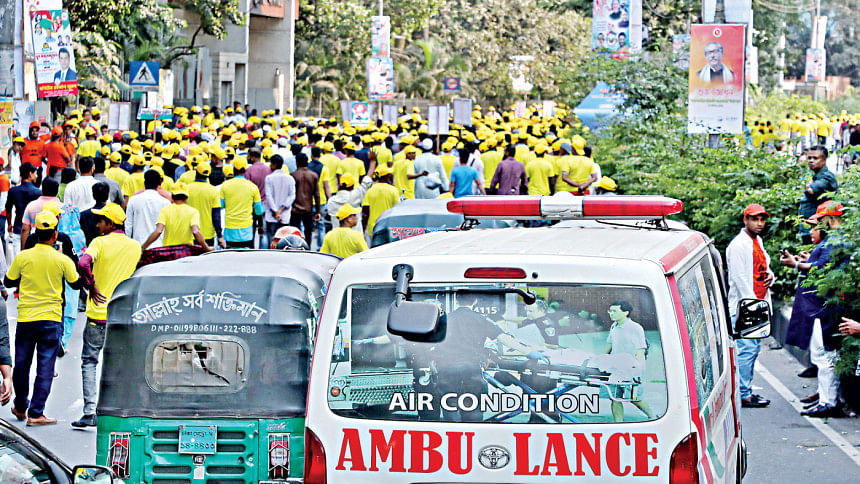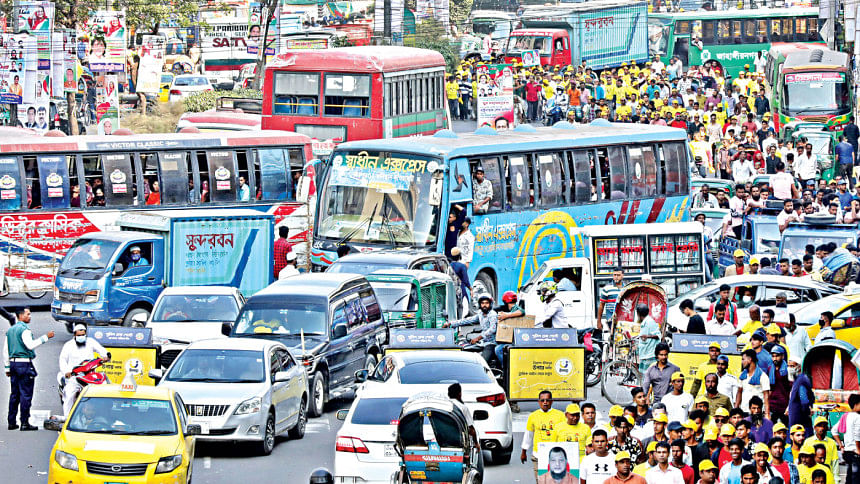People bear the brunt amid dearth of buses

Alauddin, a resident of Narayanganj, was supposed to go to his workplace at the capital's Bata Signal on Elephant Road yesterday afternoon.
But the 55-year-old didn't know what he was about to endure.
When the bus dropped him off at Purana Paltan area, he saw that vehicular movement from Paltan to Elephant Road was suspended in the afternoon, due to a massive rally.
And so, Alauddin had to walk a long distance, carrying two heavy bags, to reach his destination, as he did not find any other mode of transport.
Jubo League, the youth wing of the ruling party, organised the rally to celebrate its golden jubilee at Suhrawardy Udyan on the day.
Just like Alauddin, many commuters in the capital suffered amid the dearth of public transport, as roads around Shahbagh were blocked off.
"I had no choice but to walk from Purana Paltan to Birdem hospital, as the bus couldn't move any further. So, we were ultimately late for work," said Lavli Akter, a nurse of Birdem, who was walking with her colleague Laki Akhter.

Many were seen waiting for around an hour at bus stands in Mirpur-10, Kazipara, Shewrapara, Agargaon, and adjacent areas. Female commuters and the elderly were the worst sufferers. Auto-rickshaw drivers and rickshaw-pullers were demanding exorbitant fares amid the crisis.
Rahman Mia, a 60-year-old who was waiting at Mirpur-10 bus stand, said he had been there for 45 minutes but could not get a ride. "Usually on weekends, buses are readily available."
"When a bus arrives, it's already overcrowded. I can't get on," said Rahman Mia, who was trying to reach Dhaka Medical College Hospital to visit a relative admitted there.
Hamidur Rahman, a trader, told this newspaper, "I usually take a bus to go to Kawran Bazar. But what can I do now? It seems I have to take a CNG, which will ask for 10 times the fare of a bus ride."
"Whatever happens in this country, commoners are the only sufferers," he remarked.
Sohel Talukder, who works for a private company, said he had to wait for nearly an hour for a bus on Kuril Bishwa Road. And when he finally got on, he got stuck in a gridlock.
"After two hours, when the bus reached Bijoy Sarani, we saw that traffic movement was totally halted. So, I had to get off and walk to reach my office at Farmgate," he added.
As there was a lack of transport options, passengers depended on vehicles like auto-rickshaws and ride-sharing services.
Talking to a dozen people at different points of the capital, it was learnt that there was a lack of ride-sharing vehicles too.
Abdur Rob, a resident of Shewrapara, said he requested a ride on an app and waited for 30 minutes, but it was yet to arrive.
Riaz Ullah, a ride-sharer, said he had already gotten six trips in the first two hours, which is double the regular Friday number.
Some places -- including Airport Road, Mohakhali to Banglamotor, Babubazar to Gulishtan, and Mipur to Uttara -- faced severe traffic congestion.
"It took two hours to reach Uttara from Mirpur-12 in the morning, even though it usually takes only 20 minutes," said Md Mohshin, a ride-sharing biker.
Khandaker Enayetullah, secretary general of Bangladesh Transport Owners Association, said the transport crisis was not because of the Jubo League rally.
"Although a few buses were reserved to go to the rally, that was not the reason behind the lack of local buses on roads. A bus crisis on a weekend is normal," Enayetullah said.

 For all latest news, follow The Daily Star's Google News channel.
For all latest news, follow The Daily Star's Google News channel. 



Comments